













|
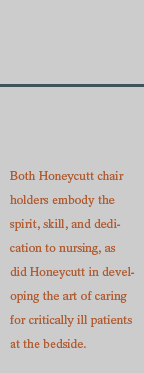
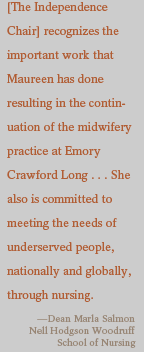 |
 |
 |
Winning
Threesome
Faculty
members named to endowed chairs
 hree
faculty hree
faculty 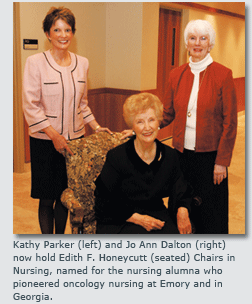 members
have been named to endowed chairs in the School of Nursing. Dr.
Jo Ann Dalton holds one of two Edith F. Honeycutt Chairs in Nursing,
while the other chair is held by Dr. Kathy Parker, who was appointed
last year. members
have been named to endowed chairs in the School of Nursing. Dr.
Jo Ann Dalton holds one of two Edith F. Honeycutt Chairs in Nursing,
while the other chair is held by Dr. Kathy Parker, who was appointed
last year.
Both chairs are the result of a 1990
endowment gift from the Community Foundation of Greater Atlanta
in honor of Edith F. Honeycutt, 39N, one of the first oncology nurses
to practice at Emory and in Georgia and the private nurse to Atlanta
philanthropist and Coca-Cola magnate Robert Woodruff and his family.
Honeycutt received the Emory Medal, the university’s highest
alumni honor, in 1997 and an honorary bachelor of science degreein
nursing in 2004.
Both Honeycutt chair holders embody
the spirit, skill, and dedication to nursing, as did Honeycutt in
developing the art of caring for critically ill patients at the
bedside. Dalton is an expert in pain management with a special focus
on cancer patients. She co-founded the North Carolina Pain Initiative,
which has become a model for promoting education about pain management.
Parker is a pioneer in studying the relationships between and among
symptoms in chronic disease. In 2001, she established the Center
for Research on Symptoms, Symptom Interactions, and Health Outcomes,
one of nine exploratory research centers funded by the National
Institute of Nursing Research.
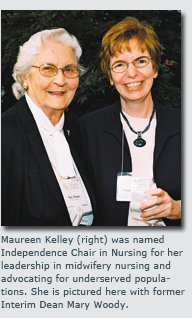 “Awarding
the Honeycutt chairs to Jo Ann and Kathy is our way of recognizing
their special qualities and paying tribute to Edith,” says
Dean Marla Salmon. “Awarding
the Honeycutt chairs to Jo Ann and Kathy is our way of recognizing
their special qualities and paying tribute to Edith,” says
Dean Marla Salmon.
Also recently, Dr. Maureen Kelley
was named to the Independence Chair in Nursing. It is endowed by
the Independence Foundation of Philadelphia to build the capacity
of nursing to serve vulnerable populations and develop nursing practice
and scholarship.
Kelley is chair of the Department
of Family and Community Health Nursing and practices nurse mid-wifery
at Emory Crawford Long Hospital. She previously directed the Nurse
Midwifery Education Program, ranked 7th in the nation along with
two other nursing schools by US News & World Report.
“This chair recognizes the important
work that Maureen has done resulting in the continuation of the
midwifery practice at Emory Crawford Long, development of a collaborative
practice with the Department of Gynecology and Obstetrics in the
School of Medicine, and introduction of a Centering Pregnancy practice
at Emory and in Atlanta,” says Salmon. “She also is
committed to meeting the needs of underserved people, nationally
and globally, through nursing.” |
 |
| |
|
|
|
| |
 |
Touching
Lives Touched by Cancer
Nursing
faculty named GCC scholars
 he
mission of the Georgia he
mission of the Georgia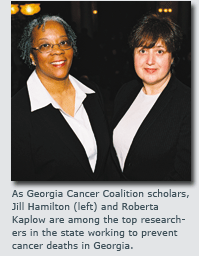 Cancer Coalition (GCC) is compelling and ambitious: to reduce the
number of cancer-related deaths in Georgia. Two School of Nursing
faculty members are among 32 top scientists recently tapped by the
GCC to move its mission forward. Drs. Jill Hamilton and Roberta
Kaplow are members of the GCC’s Distinguished Clinicians and
Scientists program, designed to advance cancer research and position
Georgia as a national leader in that arena.
Cancer Coalition (GCC) is compelling and ambitious: to reduce the
number of cancer-related deaths in Georgia. Two School of Nursing
faculty members are among 32 top scientists recently tapped by the
GCC to move its mission forward. Drs. Jill Hamilton and Roberta
Kaplow are members of the GCC’s Distinguished Clinicians and
Scientists program, designed to advance cancer research and position
Georgia as a national leader in that arena.
Both Hamilton and Kaplow, the only
nurses selected, bring special expertise to the GCC table. Hamilton,
who joined Emory last year as an assistant professor, is widely
regarded for her research on helping older African-American cancer
survivors cope with their disease. Her research also has implications
for caregivers—nurses, doctors, family members, church members,
and others—who assist patients in their recovery.
Kaplow is a clinical professor with
joint appointments in the School of Nursing and the Winship Cancer
Institute (WCI) at Emory. Through the WCI, she works closely with
nurses and physicians at the Georgia Cancer Center of Excellence
at Grady Memorial Hospital to enhance patient care standards as
a model for other cancer treatment centers in Georgia. Currently,
she is conducting a pilot study on “Pain and Sleep Interactions
in Minority Cancer Patients” through the Center for Research
on Symptoms, Symptom Interactions, and Health Outcomes in the School
of Nursing.
Kaplow and Hamilton are part of a
force that GCC is amassing to boost the amount of federally funded
cancer research in Georgia. Thus far, GCC has tapped 66 renowned
scholars for Georgia, with a goal of recruiting 150 scholars in
all.
GCC is a public-private partnership
involving universities, hospitals, biotech firms, civic groups,
and nonprofit and government agencies. In the four years since its
formation, the coalition has become a national model of collaboration
for scientists and health professionals with a common goal—in
this case, improving prevention and treatment for the approximately
35,000 Georgians diagnosed with cancer each year.
|
 |
| |
|
|
|
| |
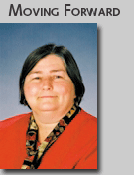
Dr.
Patricia Clark
has been promoted to associate professor with tenure in
the Department of Adult and Elder Health Nursing. Through
her research, Clark is helping patients and families affected
by Alzheimer’s disease, heart disease, and stroke.
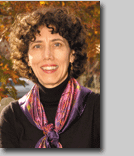
Dr.
Patrice White is a
new clinical associate professor in the MSN/MPH international
health program in the Lillian Carter Center for International
Nursing. Her studies have focused on safe motherhood, cultural
constructs of disease/problem recognition, and international
maternal-child health.
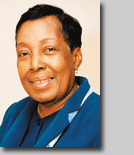
The
Metropolitan Atlanta Advanced Practice Psychiatric Nurses
Group recently honored Dr.
Maggie Gilead with
an award for her many contributions to psychiatric and mental
health nursing education. Gilead, an associate professor
in Adult and Elder Health Nursing, is a longtime advocate
of improved mental health services at local and state levels.
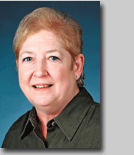
Dr. Lynda Nauright, professor
of Adult and Elder Health Nursing, has assumed the presidency
of the Georgia Nurses Foundation for the second time. She
previously served as president from 1986 to 1990.
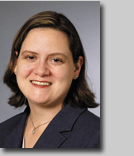
Amy Comeau holds
a new position as director of communications for the School
of Nursing. She comes to Emory from Georgia State University,
where she managed marketing and public relations forthe
Rialto Center for the Performing Arts after five years with
The Atlanta Opera.
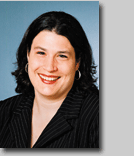
Kim Julian has joined
the School of Nursing as associate director of development
and alumni relations. She previously was membership operations
supervisor for the High Museum of Art in Atlanta.
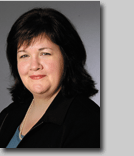
Wendy Rhein holds a
new position as director of service learning. Rhein previously
served as the HIV/AIDS campaign director for the United
States Fund for UNICEF.
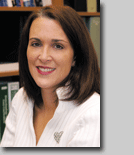
Jane Clark now serves
as assistant director for academic affairs services. Prior
to this position, she was the executive research coordinator
of the psychiatric research center at the University of
Maryland in Baltimore. |
|
| |
 |
| |
 |
|
|
| |
Enrollment Boom
 n
fall 2004, the n
fall 2004, the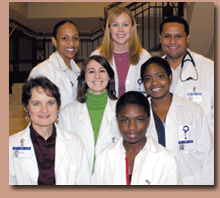 School of Nursing welcomed its largest class yet with 97 incoming
juniors like those pictured here with faculty mentor Caroline
Coburn (bottom left). The school also enrolled 76 new graduate
students and five new PhD students, while the Centennial Class
of 2005 began their senior year at 96 strong. (The school
marks its 100th anniversary this year.) As a whole, the students
have a variety of backgrounds and interests—one-third
of nursing students are pursuing their second degree, with
first degrees ranging from music, biology, and law to religion
and Spanish.
School of Nursing welcomed its largest class yet with 97 incoming
juniors like those pictured here with faculty mentor Caroline
Coburn (bottom left). The school also enrolled 76 new graduate
students and five new PhD students, while the Centennial Class
of 2005 began their senior year at 96 strong. (The school
marks its 100th anniversary this year.) As a whole, the students
have a variety of backgrounds and interests—one-third
of nursing students are pursuing their second degree, with
first degrees ranging from music, biology, and law to religion
and Spanish. |
|
| |
|
|
|
 |
 |
| |
|
|
 |
| |
Big
Jump
School
lands in top 20 for NIH research
 esearch
funding in the School of Nursing has taken a big jump. For
the first time, the school ranks among the nation’s
top 20 nursing schools for research funding from the National
Institutes of Health (NIH). esearch
funding in the School of Nursing has taken a big jump. For
the first time, the school ranks among the nation’s
top 20 nursing schools for research funding from the National
Institutes of Health (NIH).
In 2003, Emory nursing professors
won $2.3 million in NIH research funding, nearly $1 million
more than the previous year. As a result, the school jumped
from 32nd place in 2002 to 18th in 2003. It also ranked No.
6 among all private nursing schools.
Emory, the University of North
Carolina at Chapel Hill, and the University of Alabama at
Birmingham were the only three nursing programs in the Southeast
to rank in the top 20. The University of California at San
Francisco was the top-funded program, with more than $13 million.
Each year, the NIH funds research at more than 600 accredited
nursing schools in the United States. |
|
| |
|
|
|
 |
| |
|
|
 |
Sleep
and Golf Performance
Study
focuses on LPGA players
 hisking
between time zones hisking
between time zones  to
play in tournaments may be commonplace for professional golfers
in the Ladies Professional Golf Association (LPGA). But for a game
dependent on focus and concentration, could jet lag and other sleep-related
issues affect the pros’ driving and putting? to
play in tournaments may be commonplace for professional golfers
in the Ladies Professional Golf Association (LPGA). But for a game
dependent on focus and concentration, could jet lag and other sleep-related
issues affect the pros’ driving and putting?
At the request of the LPGA, Emory
nursing professor Dr. Kathy Parker is looking at a number of sleep
variables to determine their relationship with the golfers’
success in tournament play.
“Our main purposes are to describe
the quantity, quality, and pattern of sleep obtained by the players
immediately prior to and during the tournament, and to explore how
those factors relate to their eventual performance on the course,”
explains Parker. “We know that attention and focus are critical
to playing successful golf, and we also know that high levels of
attention and focus are dependent on getting quality sleep and being
adequately rested.”
|
 |
 |
 |
The
project began with a chance meeting on an airplane between golf
professional Suzanne Strudwick and School of Nursing Dean Marla
Salmon. At Salmon’s urging, Strudwick, who had experienced
personal sleep issues related to jet lag, began corresponding with
Parker. She also mentioned Parker’s work to Dr. Betsy Clark,
vice president of professional development for the LPGA, and once
approved, the plan was set in motion.
At last summer’s LPGA Tournament
in Georgia, Parker distributed more than 100 questionnaires that
rated sleep variables such as subjective sleep quality, daytime
sleepiness, restless leg syndrome, circadian rhythm type, basic
demographics, and the number of times players had traveled across
time zones in the 10 days preceding the tournament.
Once completed, the sleep quality
and sleep patterns of the LPGA golfers will be compared with a performance
profile that includes not only their total tournament score, but
also measures factors such as rank, rounds under par, birdies, driving
distance, driving accuracy, putting average, and sand saves.
“The mind-body connection in
golf has been well described because focus is critical to the game,”
says Parker. “We know that sleep is bound to be a factor in
these abilities, so it will be interesting to see the kinds of sleep
problems the players have, even if it’s just so we can develop
recommendations and educational programs to help them.”
—
Tia Webster and Amy Comeau |
 |
| |
|
|
  |
| |
|
|
| |
Advocate for Breastfeeding
Rose
Cannon retires after 29 years
 n
1973, Rose n
1973, Rose
Cannon,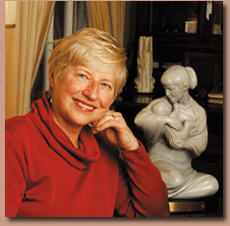 74MN, 95PhD, was the head nurse for the nurseries at Northside
Hospital when a colleague told her, “Why don’t
you get your master’s degree? You’d be a great
teacher.”
74MN, 95PhD, was the head nurse for the nurseries at Northside
Hospital when a colleague told her, “Why don’t
you get your master’s degree? You’d be a great
teacher.”
Inspired, Cannon went on to
earn her degree at Emory. “People often see things in
us that we don’t see in ourselves,” said Cannon
when she retired last fall after nearly three decades of teaching
maternal-infant nursing.
Since those days at Northside,
Cannon has touched countless lives by instructing parents
and nursing students about childbirth and breastfeeding and
promoting lactation as a way to improve health for mothers
and infants. “She’s made the world a better place
for babies and moms, and that’s no small deed,”
says Marla Salmon, dean of the School of Nursing.
Known for excellence as a teacher,
Cannon received an award from the Univeristy Teaching Fund
in 2003 for a successful course she created, “Human
Lactation and Breastfeeding Management,” and the Emory
Williams Award for Distinguished Teaching in 2002 for undergraduate
instruction.
In addition to nurturing students,
Cannon has been a role model for junior faculty through Passages,
a university-wide mentoring program, and SAGE, a faculty mentoring
initiative in the School of Nursing. In one of many leadership
roles, Cannon chaired the 1995 Politics of Caring III conference,
involving nursing, medicine, public health, and other disciplines
across Emory.
Cannon has long been passionate
about history. For her Emory doctorate, she wrote her dissertation
on “Georgia’s Twentieth Century Public Health
Nurses: A Social History of Racial Relations,” in which
she recorded the oral histories of 50 nurses in Georgia. For
this work, the Women’s History Month in Georgia Committee
and the Secretary of State honored her for “Significant
Contributions to Health Care” in 1998.
Retirement has not stopped Cannon
from being active. She continues to teach lactation and breastfeeding
in the School of Nursing and at Northside Hospital. She has
collected a series of oral histories from Emory nursing faculty
and alumni in preparation for the school’s Centennial
in 2005 and is co-chairing the annual meeting ofthe American
Association for the History of Nursing, to be hosted by the
School of Nursing next fall.
On the day of her retirement
celebration at Emory, Cannon almost needed a moving van to
carry home her retirement mementoes—a quilt stitched
by School of Nursing faculty, a memory book, an Emory chair,
and a sculpture of “Young Mother With Child” by
Oregon artist Alan Collins (pictured above).
The highlight, though, was the
announcement of the Emeritus Faculty Scholarship Fund, created
in her honor. Faculty, alumni, and others have contributed
$15,000 to the undergraduate fund thus far. As Debbie Ryan,
clinical associate professor, told Cannon, “You are
the embodiment of what women strive to be, and you have been
more than successful.”
Gifts
to the Emeritus Faculty Scholarship Fund may be sent to the
Office of Development, Nell Hodgson Woodruff School of Nursing,
Emory University, 1520 Clifton Road NE, Suite 446, Atlanta,
Georgia 30322.
|
|
| |
|
|
|
 |
| |
|
|
|
|
 |
Spring
Break Alternatives
Students
explore faith, health in the Carribbean
 ast
spring, 26 Emory nursing students headed for the Caribbean but not
to lie on the beach. They went on Alternative Spring Break to explore
the ties between faith and health in the British Virgin Islands
(BVI), the Bahamas, and Jamaica. ast
spring, 26 Emory nursing students headed for the Caribbean but not
to lie on the beach. They went on Alternative Spring Break to explore
the ties between faith and health in the British Virgin Islands
(BVI), the Bahamas, and Jamaica.
In the BVI, the stakes were high for
the 12 students who examined nearly 400 schoolchildren ages 10 to
15—a task traditionally done by physicians—in a region
where faith has a prominent role in health, education, and other
aspects of daily life. The students also taught children, parents,
and teachers about sexual health, conflict resolution, drug abuse
prevention, nutrition, and exercise. |
 |
| |
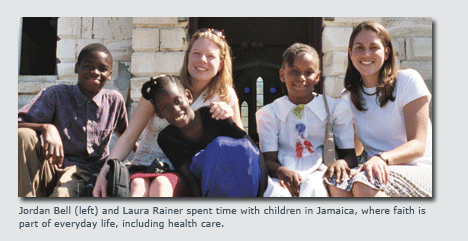 |
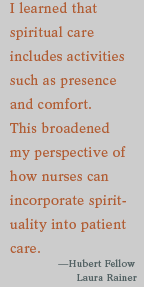 |
 |
“We
were plowing new ground,” says Ann Connor, one of two faculty
members who accompanied the undergraduate and graduate students
to the BVI. “This was the first time that nurses there were
allowed to do physical assessments. We established a new practice
model for nurses and sent a message to the children’s teachers
and parents about what nurses can do.”
When the nursing students first arrived
in the BVI, they met with several nurses, including Chief Nursing
Officer Dr. Lee Mathavious (who invited the students to come after
visiting the School of Nursing in 2003), and the Rev. Lester Bowers,
a BVI resident and doctoral student in the Candler School of Theology
at Emory. Each morning, the students attended a morning devotional
involving nurses, schoolchildren, parents, teachers, and others
from the community.
“I found it incredibly rejuvenating,”
says Emily Mason, then a nursing senior who graduated in May. “We
were singing and praying with them. It was a wonderful way to connect
with them.”
The connection between faith and health
lies at the heart of the Hubert Fellowship Program, a new initiative
based in the Lillian Carter Center for 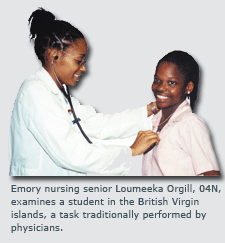 International
Nursing and funded by the O.C. Hubert Charitable Trust. While the
12 students who traveled to the BVI received course credit in community
health, the other students volunteered for clinical duty in Jamaica
and in Eleuthera in the Bahamas. All 14 volunteers are Hubert Fellows,
students with a special interest in faith, international health,
and populations who are often underserved. International
Nursing and funded by the O.C. Hubert Charitable Trust. While the
12 students who traveled to the BVI received course credit in community
health, the other students volunteered for clinical duty in Jamaica
and in Eleuthera in the Bahamas. All 14 volunteers are Hubert Fellows,
students with a special interest in faith, international health,
and populations who are often underserved.
At the Tarpum Bay Clinic in Eleuthera,
Heather Blair, now a nursing senior, was deeply touched when one
of the nurses described how having the students there made her feel
less isolated and lonely.
“I didn’t do anything
to make this happen except to listen to her experiences, show an
interest in her life and work, and be available, but for her it
made a difference,” says Blair.
Working through United Methodist Volunteers in Mission, Blair
and six other students observed in health clinics, accompanied nurses
on home visits, surveyed a group of Haitian women living on Eleuthera
about their health care needs, addressed high school and grade school
students about health topics, participated in a health fair, and
visited a family wellness center in Nassau.
During home visits, the Eleuthera
nurses provided medications and monitored patients who were elderly,disabled,
or had health problems such as heart disease and diabetes. At the
very least, “the nurses found out where the patients were
emotionally and spiritually,” says Molly Swensen, a graduate
student who is working on a dual degree in nursing and public health.
“They often shared a prayer or passage from scripture with
them.”
Faith also is a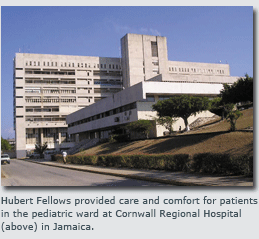 guiding force for nurses in Jamaica. Students there were hosted
by the Cornwall School of Nursing and spent considerable time in
the pediatric ward at Cornwall Regional Hospital, in clinics for
patients with sexually transmitted diseases and HIV/AIDS, and with
community agencies serving patients with mental illness. While working
on the pediatric floor in the hospital, students did their best
to comfort children who were in pain or whose family members were
not present.
guiding force for nurses in Jamaica. Students there were hosted
by the Cornwall School of Nursing and spent considerable time in
the pediatric ward at Cornwall Regional Hospital, in clinics for
patients with sexually transmitted diseases and HIV/AIDS, and with
community agencies serving patients with mental illness. While working
on the pediatric floor in the hospital, students did their best
to comfort children who were in pain or whose family members were
not present.
“I learned that spiritual care
includes activities such as presence and comfort,” says Laura
Rainer, then a nursing junior. “This broadened my perspective
of how nurses can incorporate spirituality into patient care.”
As in the BVI and Eleuthera, the students
in Jamaica took part in daily devotionals with nurses and others.
The experience “offered the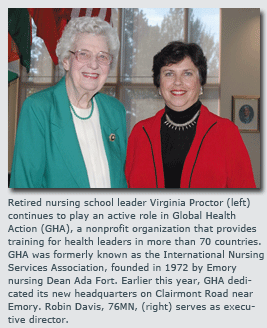 students a way of seeing how you can use your faith to strengthen
yourself as a practitioner and share that faith with patients in
a way that strengthens them,” says Emory nursing instructor
Sara Edwards. “That was very powerful for the students to
see.”
students a way of seeing how you can use your faith to strengthen
yourself as a practitioner and share that faith with patients in
a way that strengthens them,” says Emory nursing instructor
Sara Edwards. “That was very powerful for the students to
see.”
Shortly after the students returned
to Emory, they shared what they had learned with a School of Nursing
audience that included Virginia Proctor, 50G, 50Th, who served as
director of student development for Dean Ada Fort some 40 years
ago. It was Fort who first opened the door of opportunity for Emory
nurses with an interest in faith and international health. “This
is exactly what Ada Fort had in mind,” said Proctor after
hearing the students’ presentation. “She would be so
proud.”
—Pam
Auchmutey |
 |
| |
|
|
|
| |
 |
| |
|
|
| |
'3+2'
Equals Partnership
Emory,
Agnus Scott forms joint degree program
 ith
the national nursing ith
the national nursing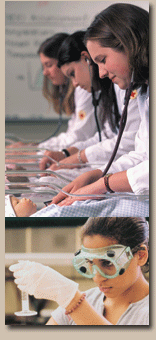 shortage
expected to top 250,000 by 2010, the need to attract more
students into the nursing profession is a critical charge
for nursing schools all over the country. To meet this challenge
head on, the School of Nursing expanded its undergraduate
enrollment this past fall and formed a dual-degree partnership
with Agnes Scott College to attract a new crop of students. shortage
expected to top 250,000 by 2010, the need to attract more
students into the nursing profession is a critical charge
for nursing schools all over the country. To meet this challenge
head on, the School of Nursing expanded its undergraduate
enrollment this past fall and formed a dual-degree partnership
with Agnes Scott College to attract a new crop of students.
Marla Salmon, dean of the School
of Nursing, and Rosemary Lévy Zumwalt, vice president
for academic affairs and dean of Agnes Scott, worked in tandem
to form the new five-year program, which will enroll its first
students next fall. The 3+2 program is available to any student
enrolled at Agnes Scott, where they will complete a liberal
arts program in three years and then transfer to Emory to
complete the BSN program in two years.
“This dual-degree program
enables us to reach out to another community of very smart
and talented students who may not originally have considered
nursing,” says Salmon. “The opportunity to attract
student scholars with a strong liberal arts background complements
our vision for preparing nursing leaders who will transform
care.”
Zumwalt believes that students
will seize the opportunity for a dual degree. “This
program gives students interested in nursing the best that
Agnes Scott and Emory have to offer—an exceptional foundation
in liberal arts and a degree from one of the most prominent
nursing programs in the United States.”
—Amy
Comeau |
|
| |
|
|
|
 |
| |
|
|
|
| |
|
|
|
| |
|
|
|
| |
|
|
|
|